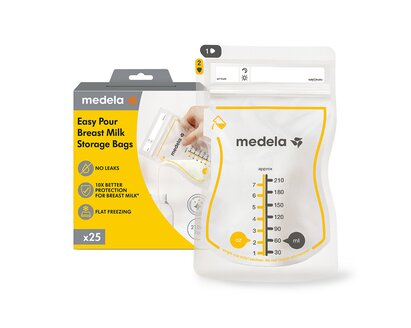Getting the work-life balance right can be challenging when planning your return to work after maternity leave. You might feel torn between the emotional pull of leaving your baby and the need to earn money, or the desire to stay connected to your job and develop your career.
If you’re breastfeeding and want to continue, you also need to think about how you’ll maintain your milk supply and ensure your baby can continue to have your breast milk when you’re not around. This often means expressing breast milk at work and storing and transporting it safely, so that your caregiver can feed it to your child.
What are the benefits of continuing breastfeeding when back at work?
Returning to work can be a wrench when you’ve spent many weeks or months one-to-one with your new baby. Continuing to breastfeed is one way to sustain the important bond between you and ease you both into a new routine.
Breastfeeding can also be a lovely way to reconnect when you spend more time apart, as Peggy, mom of one, Switzerland, found: “I returned to work when Penelope was six months old. By then, I was still breastfeeding her just before leaving for the office and when coming home. That remained our special time together.”
Bear in mind, too, that your baby can still enjoy all the health-giving and protective properties of breast milk if you return to work. There are many components in your breast milk that fight infections and help your little one recover faster if she becomes ill. Studies even show that breastfeeding moms take less time off work than those who don’t breastfeed, because their babies are ill less frequently.1
When should I return to work?
Some moms don’t have much choice over when to go back. It might be determined by your employer, maternity laws in your country, or financial need. If you’re fortunate enough to have flexibility, weigh up the pros (such as income, career progression, mental stimulation or social contact) and the cons (being apart from your baby, childcare costs or complicated logistics) and speak to friends and colleagues about their experiences before deciding.
Bear in mind that breastfeeding and expressing while at work, and caring for a baby or toddler too, can be physically and emotionally draining. However, some moms also find that pumping provides welcome respite during a busy working day.
“Coming back to work and focusing on my job for eight hours was hard, so I kind of enjoyed the breaks for pumping,” says Monika, mom of three, Switzerland. “It was time for myself when I could sit down, close my eyes and relax.”
What about childcare?
Choose a childcare provider who’s happy to give your baby your expressed breast milk and/or welcomes you breastfeeding when you drop off and collect your baby. Discuss this before you sign up, and explain your needs clearly.
Ask how they’ll store your breast milk and discuss how your baby likes to have her milk – warm or cold, while being held, or feeding independently under supervision (if aged six months plus) – so she’s more likely to accept it.
If you’re lucky enough to have family members on childcare duty, leave them with plenty of milk and instructions for feeding.
What should I ask my employer?
Get in touch with your employer as soon as you know you intend to return to work, even if the date is months away. You’ll want to discuss your working hours and how they can support your continued breastfeeding. You may want to return part-time or consider a job share, or do ‘compressed’ hours so you work longer days but fewer of them.
“I had six months’ maternity leave, and afterwards it felt OK to start working again. I now work part-time, 60% of the week, and that’s perfect for me,” says Andrea, mom of two, Switzerland.
If you work for a large organization, contact your human resources department to discuss their breastfeeding policy. If no staff members have expressed milk before, be a trailblazer and become the first.
If you intend to express milk at work, give your employer plenty of notice. In many countries employers are legally obliged to provide a private space where moms can pump, regular breaks for expressing, and somewhere to store breast milk safely. Find out if your country has employment guidance for breastfeeding mothers and read up on it.
“My advice is to have a plan prior to returning to work,” says Shalena, mom of two, Canada. “Determine your needs – how often you need to pump, how long for, and where. Explaining that your needs will change as your baby grows is also important. Make sure you know your rights and responsibilities, and be confident setting out your plans.”
An alternative to pumping at work is to organise childcare close to your workplace so you can take breaks to breastfeed your baby at her usual feeding times.
How should I prepare for my return to work?
If you’re breastfeeding, practise pumping and giving your baby the expressed milk a few weeks in advance, to get both of you used to feeding this way.
You also need to work out the best expressing choice for you. This might be an electric breast pump, a manual one, or even expressing by hand. The efficiency, cost, portability and quietness of the pump may all influence your choice.
Encourage family and friends feed your baby expressed breast milk so she gets used to being fed by other people. Your baby may be more willing to take your milk from someone else if you aren’t in the room.
Having carefully planned your return, it’s time to think about the logistics of expressing at work – check out our articles on pumping at work, storing and transporting your breast milk safely, and pumping while away from home.















































